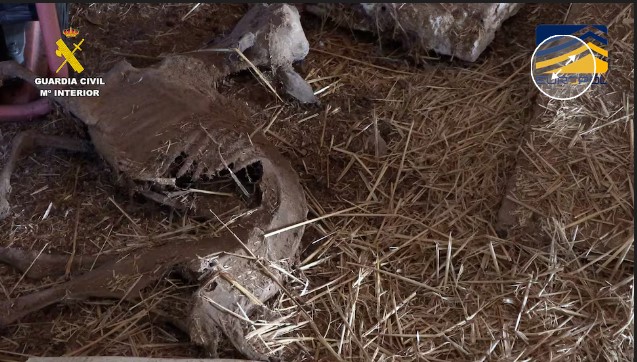A shocking case of animal abuse and public health endangerment has been uncovered in Madrid and its surrounding areas: The Guardia Civil, in “Operation Smallpox,” has arrested five individuals and is investigating twelve others for crimes against public health, animal cruelty, document forgery, membership in a criminal organization, and money laundering. At the heart of the investigation are illegal slaughterhouses where sick and dying animals were brutally slaughtered, and their meat sold without traceability to restaurants and private individuals.
The Slaughterhouse of Horrors in San Fernando de Henares
A dirt road near San Fernando de Henares, east of Madrid, led investigators to what appeared to be an idyllic country house, but turned out to be a scene of unimaginable suffering. In a dilapidated enclosure, officers from Seprona (the Guardia Civil’s environmental protection unit) found over 200 sick, dying, and already dead goats and sheep. The stench of decay, surrounded by dirt, severed animal heads, and rats, bore witness to the gruesome conditions. Some animals were visibly suffering, others had already decomposed, including one goat with a massive tumor.
In makeshift tin shacks, which generate unbearable heat in summer, the hides of dead animals were burned with a blowtorch – a dangerous and unhygienic practice. The smell of death hung heavy in the air. Alongside these, tiny cages used for transporting live animals and dead rats beside puddles of blackish liquid were found.
#OperacionesGC | Desmantelada una red dedicada a la comercialización ilegal de productos cárnicos sin control sanitario
— Guardia Civil (@guardiacivil) May 26, 2025
➡️Se han detectado varios mataderos clandestinos y centros de concentración de animales en las provincias de Ávila, Toledo y Madrid
➡️5 personas han sido… pic.twitter.com/QW7UrxEuRZ
Shocking Slaughter Conditions and Health Risks
Another shack served as an illegal slaughterhouse. A dirty wooden platform, knives covered in dried blood, and rotting goat heads on the floor presented a horrifying scene. Here, animals were slaughtered without any hygiene and their meat was directly supplied to buyers. The poor condition of the animals, many showing signs of diseases like sheep or goat pox and malnutrition, as well as the appalling slaughter conditions, shocked even experienced investigators. Commander José Carlos Martínez of Seprona emphasized that such conditions are extremely unusual in Spain.
A Network of Illegal Activities
“Operation Smallpox” was initiated after it was discovered that meat from illegal slaughtering was supplied to ten Asian restaurants in Madrid’s Usera district and the Cobo Calleja industrial estate (Fuenlabrada). Four of these establishments have already been closed. The meat was offered both on menus and via home delivery through online platforms.
According to investigative sources, the main suspect operated a clandestine livestock farm in the province of Toledo, from where he organized the illegal transport of sheep and goats. Animals from both legal and illegal farms were transported with forged documents, with some going directly to a slaughterhouse in Ávila and the rest ending up at the secret slaughterhouse in San Fernando de Henares. There, animals were slaughtered without authorization, under inadequate hygienic conditions, and without adhering to animal welfare regulations.
In addition to supplying restaurants, the meat was also sold directly to private individuals, again without traceability or hygiene control. The criminal organization also used forged documents to commit tax evasion and money laundering through cash payments and irregular invoicing. The group had a defined hierarchical structure, with members responsible for the transport, slaughter, and distribution of the illegal meat.
Consequences of the Raid
All animals in the San Fernando enclosure were seized. Although originally planned to send the healthy animals to shelters, due to their extremely poor condition, approximately 350 animals had to be euthanized. This case is a severe blow against the illegal trade in meat products and underlines the need for increased hygiene controls and food safety. The investigation remains under wraps.




